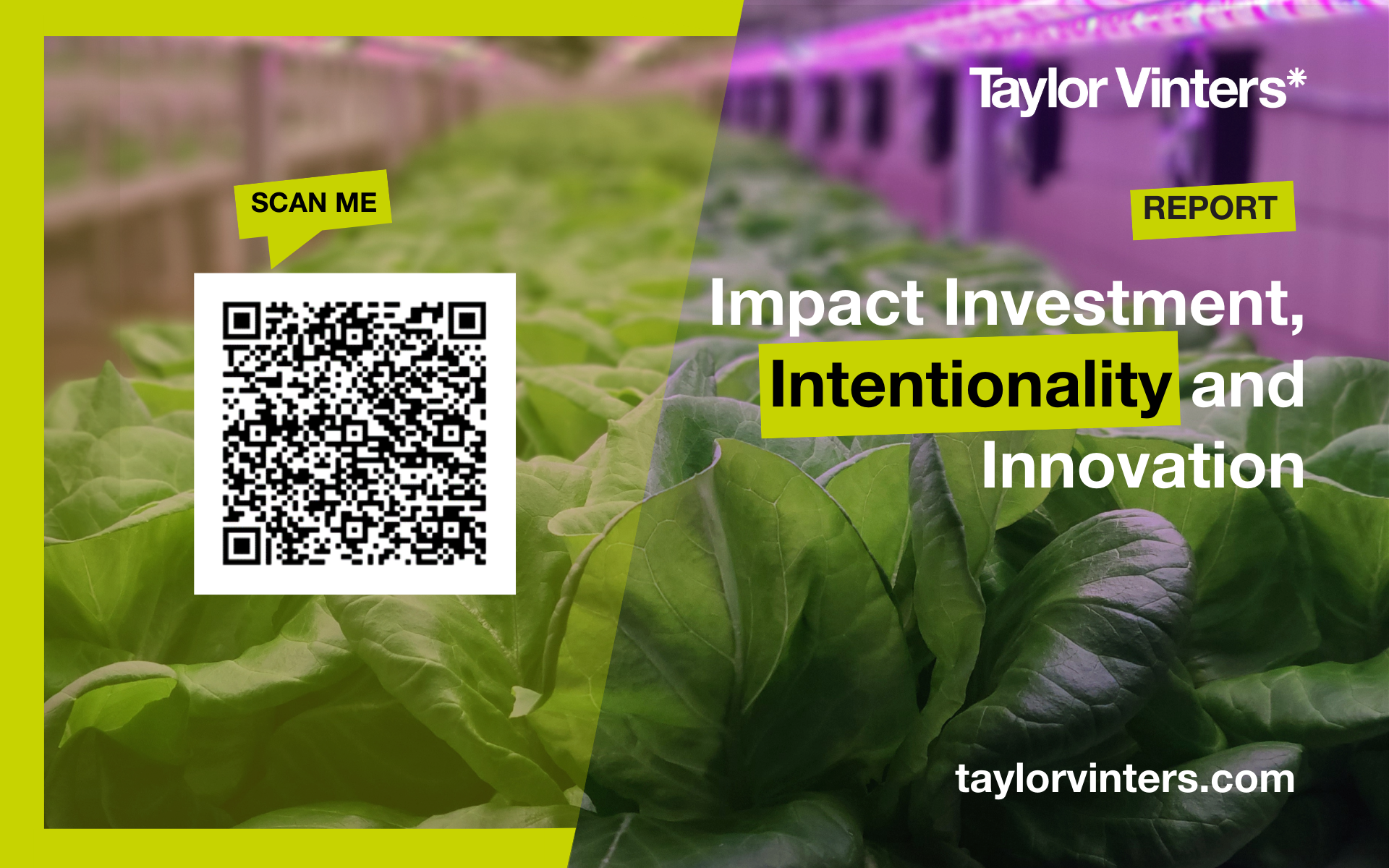Member updates
Major New Finance On The Way for Social Entrepreneurs, Innovators and Start-Ups

October 2022
Impact investing is on the brink of becoming a mainstream investment channel that will create finance for a new wave of impact entrepreneurs, innovators and start-ups to deliver urgently needed solutions to social and environmental challenges, according to qualitative research released by global legal and advisory practice, Taylor Vinters.
Research based on hour long interviews of a panel of 36 key figures representing impact investors, investee companies, independent experts and public bodies working within the impact sector, reveals impact investing is already entering the mainstream with heavyweight private equity investors, including Apollo, KKR, Bain and TPG entering with funds targeting positive social and environmental impact, and that angel investors and VCs are also seeing impact as an important driver of commercial potential.
The research found that there is a need to let go of the view that impact investing is the preserve of smaller, boutique and specialised investment houses. The study highlighted that impact investors are on the hunt for ‘solution seeking’ investments that support positive, intentional impact from products and services that demonstrably make the world a better place from a social and environmental standpoint.
Findings point to the potential of the impact sector to provide solutions to major social challenges such as housing, homelessness and social care, and that there is an opportunity for government and impact investors to work together in these areas suggesting a combined strategy coming from government, business, public sector and the third sector. An example given is linking sustainable housing to tackling the housing shortage and homelessness, and how impact investors can play a full role in delivering on targets relating to these areas.
Also identified is the potential for the role of impact investing to support government’s Levelling Up Agenda (and any successor), through to the need for government to carefully consider those areas of economic, social, and cultural activity where a fully catalysed impact investment community could play a vital role in successfully addressing social challenges.
The wider belief revealed by the research, is that unlocking this potential requires vision from government. For example, if government sought to link greener housing with attempts to tackle the housing shortage and homelessness, and set ambitious and stretching targets, consideration could be given to how impact investors could play a full role in delivering on those ambitions. In light of adopting such an approach, government could then consider how it would need to act in terms of providing incentives, or seed capital for new innovation.
Impact investing and ESG are not the same, but are complementary
The study finds that a major factor for the growth of impact investment in the mainstream of investing, is the need to have a clear recognition of the distinct roles and opportunities of impact investing and Environmental Social and Governance (ESG) reporting.
The key distinction between impact investment and ESG monitoring is considered to be that impact ventures are founded on clearly defined, high levels of intentionality, and that ESG monitoring is rooted in compliance and reporting.
A key observation is that impact ventures can offer quicker, more innovative solutions to major global challenges, such as environmental degradation and renewable energy, compared to ESG compliance and reporting, which is more focused on describing the status quo and also subject to risk from confusing metrics, and to claims of ‘green-washing’.
Market innovation required
The second identified necessary factor for impact investing to become grounded in the mainstream of investing, is market innovation. This involves understanding that the impact element of business models has real intrinsic value. Participants in the research identified a growing awareness and realisation that intentionality of impact is an essential indicator of sustainable value. At a time of change in a more uncertain world, impact has become a long-term indicator of worth, and that the impact element of businesses should be considered an asset with financial value.
However, it is also considered that a situation needs to be created that allows stakeholders to determine a more precise spectrum of intentionality and return for investors seeking highly scalable, deployable propositions with market rate returns.
‘Impact first, investment first’ strategy
Research participants highlighted the fact that already this has led to what is becoming more commonly known as the ‘impact first, investment first’ model, in which impact and finance is in a lock-step relationship.
Another important element required for successful market innovation is marketisation. That the right rewards have to be created to generate results, how best to price externalities, and to incentivise investment and corporate behaviours. For example, innovations in shareholder agreements and other legal documents that underpin company formation and venture founder benefits.
The research identified that networks within the impact investing sector are considered vital to market innovation as they will help educate, and ensure impact assessment and due diligence in investment practice. The networks and organisations named include: VentureESG, Diversity ESG, GINN’s Gender Lens Investing Hub, Responsible Investment Network – Universities (RINU), the Impact Investing Institute and Big Society Capital.
Impact ventures can solve the biggest global challenges
There is a view that there are very significant financial return opportunities from highly intentional impact ventures that address major challenges such as global warming, energy supply and inequality within societies. And in addition, momentum can be accelerated in the impact investment sector to significantly drive economic growth by increasing the rate of innovation across all business areas leading to a new phase of businesses creation, new products and services, productivity improvements, increases in GDP, increased employment, as well as generating positive impact.
‘The results of this report are simple. If we accelerate innovation in the impact investment ecosystem, we will accelerate innovation across the whole of business. It would create extraordinary dividends by enabling growth and urgently needed solutions to the economic, energy, environmental and social challenges,’ comments Taylor Vinters CEO, Matt Meyer.
‘Unlocking the potential of impact investment could not be more timely in terms of the need to address the major challenges we face. There is a real opportunity to make a significantly positive difference through commitment to what is the investment channel of the future.’
Interviews with research panel members were one hour in length, and conducted independently by market strategy consultant and author, Dr John Knell.
CLICK HERE TO DOWNLOAD THE REPORT




